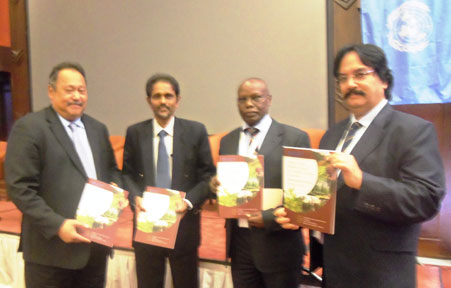Tea sector strategy for climate change
A comprehensive report on the impact of climate change, vulnerability
and adaptation strategies for the tea sector in Sri Lanka was released
at the FAO-IGG (Food and Agriculture Organisation Inter-Governmental
Group) on Tea Conference at Naivasha, Kenya recently.
The report was written jointly by the scientists of the working group
on climate change representing India, Sri Lanka, Kenya and China as a
report of the FAO-IGG on tea.
|

The authors Dr. M.A.Wijeratne of Sri Lanka, Dr. RM Bhagat,
India, Dr. John K Bore, Kenya and Dr. Wenyan Han, China, at
the launch of the report. |
Dr. M.A.Wijeratne, Senior Research Officer and Officer in Charge of
the Tea Research Institute, Low Country Regional Centre, contributed to
the chapter from Sri Lanka and the other authors were Dr. R.M. Bhagat of
India, Dr. John K Bore, Kenya and Dr. Wenyan Han, China.
The first copy of the report was presented to the Secretary,
Intergovernmental Group on Tea, Kaison Chang.
The report highlights the present status of the tea industry, tea
growing regions and their climatic conditions, climate trends, impact of
climate change and vulnerable regions and most appropriate adaptation
strategies to minimize adverse impact.
Some implications and barriers for adopting to climate change and
policy interventions needed have also been listed in the report. The
report reveals that warmer regions with poor soil conditions are highly
vulnerable to climate change impact.
Tea lands at high elevations are projected to benefit by rising
ambient CO2 levels and temperatures.
As a result tea cultivations in many countries are projected to be
shifted to higher altitudes. When tea growing regions of Sri Lanka are
considered, the low country region where the largest number of
smallholdings are scattered are projected to be highly vulnerable to the
adverse impact of climate change.
Of the proposed adaptation strategies, selecting the most suitable
agro-ecological regions with good soil conditions for tea cultivation
(replanting and expansion), crop diversification to reduce risk of
mono-cropping, use of a basket of cultivars incorporating drought, pest
and disease tolerant tea cultivars, in addition to those of high yield
potential, soil and soil moisture conservation and improvement, proper
planting and management of shade trees, rainwater harvesting and
irrigation, judicious use of chemical fertilizers and afforestation are
given high priority.
The report emphasizes the need for policy interventions in the areas
of strengthening R&D institutes and their extension arms to conduct
further assessments on climate change impact, develop technologies
applicable to different regions and farm sizes and conduct awareness
programmes, providing guidance and financial assistance for climate
change adaptation and mitigation (reduce Green House Gas emissions and
increase Carbon sequestration) strategies, nature conservation and
eco-tourism, establishment of national and international networks on
climate change to share knowledge and technologies, investments on field
infrastructure development such as drainage system, irrigation system,
road network and ecosystem diversity to improve level of adaptability of
tea growers to climate change and introducing crop insurance schemes to
minimize the impact on tea growers and other stakeholders.
|

